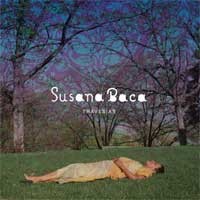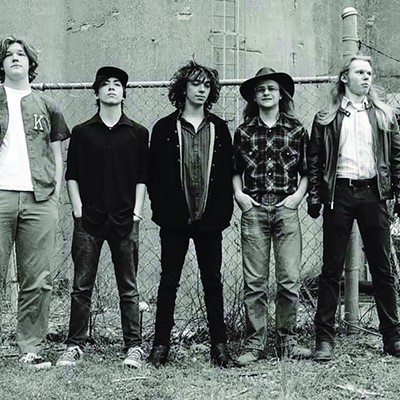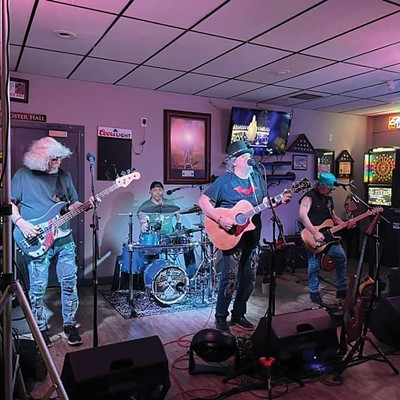A big, big world
Susana Baca is fluent in the only speech that matters

Susana Baca
Traves'as
(Luaka Bop)
[
{
"name": "Air - MedRect Combo - Inline Content 1",
"component": "11490391",
"insertPoint": "3",
"requiredCountToDisplay": "1",
"parentWrapperClass": "fdn-ads-inline-content-block"
},{
"name": "Air - MedRect Combo - Inline Content 2",
"component": "11490392",
"insertPoint": "7",
"requiredCountToDisplay": "5",
"parentWrapperClass": "fdn-ads-inline-content-block"
},{
"name": "Air - MedRect Combo - Inline Content 3",
"component": "11490393",
"insertPoint": "12",
"requiredCountToDisplay": "9",
"parentWrapperClass": "fdn-ads-inline-content-block"
}
]
Susana Baca
Traves'as
(Luaka Bop)
Travesías means “passages” in Spanish, and it’s an especially appropriate title for Susana Baca’s latest album, her fourth for Luaka Bop. Last August, after a trip to the Congo, the Afro-Peruvian singer and ethnomusicologist began a fellowship at Tulane University, in New Orleans, where she planned to study the music of the African diaspora. Her academic work was interrupted three weeks later by another diaspora of sorts, when Hurricane Katrina forced Baca, along with thousands of New Orleanians, to flee the ruined city. She ended up at the University of Chicago, where she’s completing the fellowship. Baca, who co-founded a cultural center in her hometown of Santa Barbara, Peru, is committed to safeguarding the musical legacy of her slave ancestors. But despite her preservationist tendencies, she’s no purist. She prefers circles to straight lines, passion to pedagogy; Travesías, like all her albums, celebrates the cross-continental miscegenation that accounts for so much of what is beautiful and fascinating in every culture. Although the “world music” tag is often obnoxiously misapplied to anything that isn’t American or British in origin, in this case the label works: Baca’s music really does contain the world, or at least big chunks of it. The CD was recorded in New York City and features lyrics sung in French, Haitian Creole, Portuguese, English, and (of course) Spanish. The supporting cast widens her sphere of influence even further, with contributions from longtime sidemen Marc Ribot, Juan Cotito Medrano, and Sergio Valdeos and guest turns by the Tosca Strings and Brazilian singer/songwriter Gilberto Gil. As usual, though, it’s Baca’s exquisite contralto that dominates the disc, lending it an emotional coherence that blurs the borders of language and genre. Her dulcet quaver is small but eloquent, able to convey a range of feelings with subtlety and depth. On “Volcano,” it floats in the band’s warm acoustic thrum for awhile, starts to simmer, and then quietly erupts. On the dreaming, droning “Palomita Ingrata,” she sounds like a pleading child, whereas the Santanaesque “Né Quelque Part,” with its twanging guitars and hypnotic background chanting, elicits a more defiant performance. By turns regal, fierce, sorrowful, and sultry, her voice is fluent in the only speech that matters, the kind that needs no translation.
Megan Reilly
Let Your Ghost Go
(Carrot Top)
On her second album, Let Your Ghost Go, Megan Reilly evokes a bit of Memphis, where she grew up, and a bit of Brooklyn, where she now resides. Memphis comes out in her accent, which betrays the remnants of a twang (“tired” sounds like “tarred”), and her sporadic vibrato, which recalls the great honky-tonk angels of yore. Brooklyn comes out in her edgy art-rock arrangements, which producer Sue Garner and Reilly’s all-star backing band (featuring members of the Mekons, Pere Ubu, and Cat Power) carry out to perfection. Regional markers aside, Reilly’s natural milieu seems to be the liminal — harder to pinpoint, perhaps, because it’s nowhere and everywhere at once, saturating the songs like a half-remembered dream. Her flickering folk-pop conjures sepia-stained memories and vague apparitions, intimations of mortality that darken every spangly surface. “On a Plane,” a lovely but unsettling ballad, elegizes Reilly’s dead grandmother; the title track, a more rollicking number with a pronounced Celtic flavor, pays tribute to the late Thin Lizzy frontman Phil Lynott, whose “Little Girl in Bloom” Reilly covers immediately beforehand. At its best, her music works on an almost subliminal level, lulling you into a state of perfect receptiveness and infiltrating your consciousness like a restless spirit.
Traves'as
(Luaka Bop)
Travesías means “passages” in Spanish, and it’s an especially appropriate title for Susana Baca’s latest album, her fourth for Luaka Bop. Last August, after a trip to the Congo, the Afro-Peruvian singer and ethnomusicologist began a fellowship at Tulane University, in New Orleans, where she planned to study the music of the African diaspora. Her academic work was interrupted three weeks later by another diaspora of sorts, when Hurricane Katrina forced Baca, along with thousands of New Orleanians, to flee the ruined city. She ended up at the University of Chicago, where she’s completing the fellowship. Baca, who co-founded a cultural center in her hometown of Santa Barbara, Peru, is committed to safeguarding the musical legacy of her slave ancestors. But despite her preservationist tendencies, she’s no purist. She prefers circles to straight lines, passion to pedagogy; Travesías, like all her albums, celebrates the cross-continental miscegenation that accounts for so much of what is beautiful and fascinating in every culture. Although the “world music” tag is often obnoxiously misapplied to anything that isn’t American or British in origin, in this case the label works: Baca’s music really does contain the world, or at least big chunks of it. The CD was recorded in New York City and features lyrics sung in French, Haitian Creole, Portuguese, English, and (of course) Spanish. The supporting cast widens her sphere of influence even further, with contributions from longtime sidemen Marc Ribot, Juan Cotito Medrano, and Sergio Valdeos and guest turns by the Tosca Strings and Brazilian singer/songwriter Gilberto Gil. As usual, though, it’s Baca’s exquisite contralto that dominates the disc, lending it an emotional coherence that blurs the borders of language and genre. Her dulcet quaver is small but eloquent, able to convey a range of feelings with subtlety and depth. On “Volcano,” it floats in the band’s warm acoustic thrum for awhile, starts to simmer, and then quietly erupts. On the dreaming, droning “Palomita Ingrata,” she sounds like a pleading child, whereas the Santanaesque “Né Quelque Part,” with its twanging guitars and hypnotic background chanting, elicits a more defiant performance. By turns regal, fierce, sorrowful, and sultry, her voice is fluent in the only speech that matters, the kind that needs no translation.
Megan Reilly
Let Your Ghost Go
(Carrot Top)
On her second album, Let Your Ghost Go, Megan Reilly evokes a bit of Memphis, where she grew up, and a bit of Brooklyn, where she now resides. Memphis comes out in her accent, which betrays the remnants of a twang (“tired” sounds like “tarred”), and her sporadic vibrato, which recalls the great honky-tonk angels of yore. Brooklyn comes out in her edgy art-rock arrangements, which producer Sue Garner and Reilly’s all-star backing band (featuring members of the Mekons, Pere Ubu, and Cat Power) carry out to perfection. Regional markers aside, Reilly’s natural milieu seems to be the liminal — harder to pinpoint, perhaps, because it’s nowhere and everywhere at once, saturating the songs like a half-remembered dream. Her flickering folk-pop conjures sepia-stained memories and vague apparitions, intimations of mortality that darken every spangly surface. “On a Plane,” a lovely but unsettling ballad, elegizes Reilly’s dead grandmother; the title track, a more rollicking number with a pronounced Celtic flavor, pays tribute to the late Thin Lizzy frontman Phil Lynott, whose “Little Girl in Bloom” Reilly covers immediately beforehand. At its best, her music works on an almost subliminal level, lulling you into a state of perfect receptiveness and infiltrating your consciousness like a restless spirit.
Illinois Times has provided readers with independent journalism for almost 50 years, from news and politics to arts and culture.
Your support will help cover the costs of editorial content published each week. Without local news organizations, we would be less informed about the issues that affect our community..
Got something to say?
Send a letter to the editor and we'll publish your feedback in print!


















